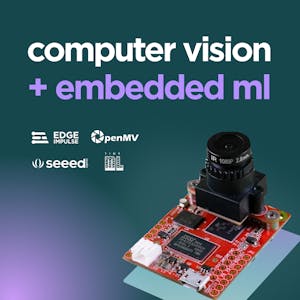Computer Vision with Embedded Machine Learning
About this Course
Computer vision (CV) is a fascinating field of study that attempts to automate the process of assigning meaning to digital images or videos. In other words, we are helping computers see and understand the world around us! A number of machine learning (ML) algorithms and techniques can be used to accomplish CV tasks, and as ML becomes faster and more efficient, we can deploy these techniques to embedded systems. This course, offered by a partnership among Edge Impulse, OpenMV, Seeed Studio, and the TinyML Foundation, will give you an understanding of how deep learning with neural networks can be used to classify images and detect objects in images and videos. You will have the opportunity to deploy these machine learning models to embedded systems, which is known as embedded machine learning or TinyML. Familiarity with the Python programming language and basic ML concepts (such as neural networks, training, inference, and evaluation) is advised to understand some topics as well as complete the projects. Some math (reading plots, arithmetic, algebra) is also required for quizzes and projects. If you have not done so already, taking the \"Introduction to Embedded Machine Learning\" course is recommended. This course covers the concepts and vocabulary necessary to understand how convolutional neural networks (CNNs) operate, and it covers how to use them to classify images and detect objects. The hands-on projects will give you the opportunity to train your own CNNs and deploy them to a microcontroller and/or single board computer.Created by: Edge Impulse

Related Online Courses
Around the world, we find ourselves facing global epidemics of obesity, Type 2 Diabetes and other predominantly diet-related diseases. To address these public health crises, we urgently need to... more
As the recommended third course of the specialization, Strategic Communication Campaigns, this course rounds out your communication campaign process knowledge by speaking to how to implement and... more
In this course, you will step into the shoes of a compliance officer at a major bank, uncovering how generative AI can transform traditional fraud detection methods. With fraudsters becoming... more
This is a self-paced lab that takes place in the Google Cloud console. In this lab, you learn to use BigQuery to find data, query the data-to-insights public dataset, and write and execute... more
The biggest challenge facing the hospitality industry over the next 5 years is the lack of integration between the key commercial disciplines of sales, revenue, distribution and finance and the... more








